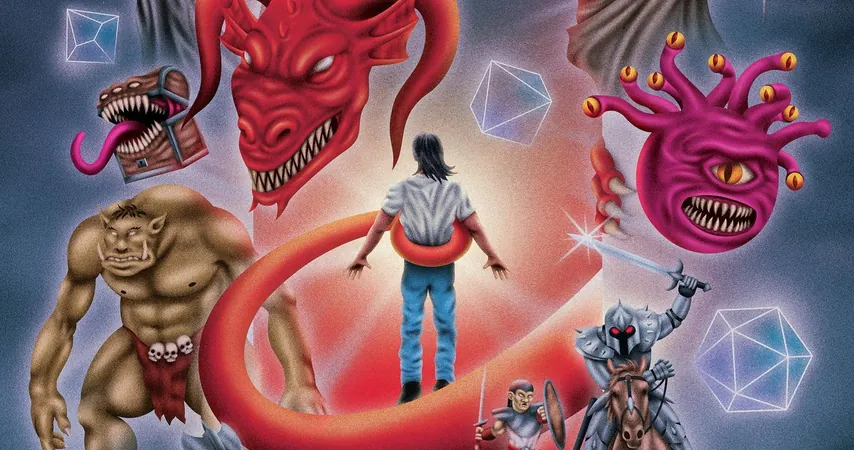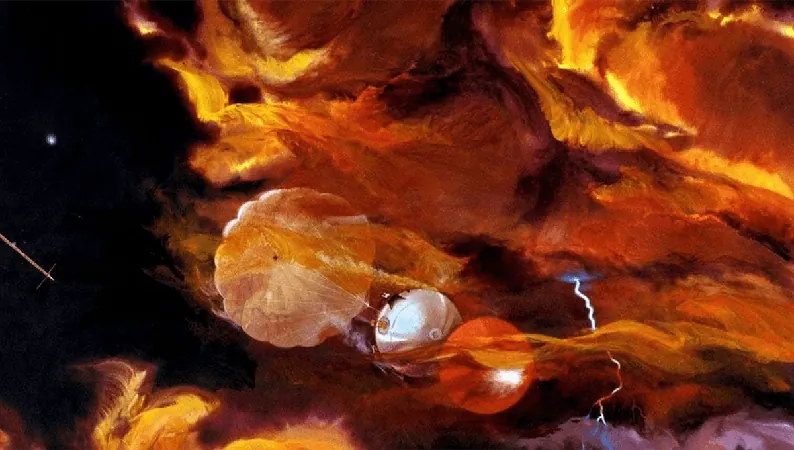
Why Is Dungeons & Dragons Still So Misunderstood?
2024-12-30
Author: Wei
The Incident that Sparked Controversy
In the summer of 1979, a concerning incident involving a teenager named James Dallas Egbert III shocked the nation when he vanished while reportedly engaging in a “bizarre intellectual game.” The police found a suicide note in his dorm at Michigan State University, alongside maps detailing the underground steam tunnels of the campus. Dallas had recently become infatuated with a game known as Dungeons & Dragons, a unique role-playing game that allowed players to embody fantastical heroes, slay monsters, and uncover treasures through intricate storytelling, dice rolling, and imagination. Initially, authorities mistook it for a dangerous cult endeavor, reflecting the cultural fears of the era surrounding brainwashing and devil worship. The Egbert family’s private investigator even claimed that the game led to Dallas’ confusion between reality and fantasy. Sadly, Dallas’ disappearance was more about personal struggles than the allure of the game; he ultimately survived and later resurfaced in Louisiana but tragically took his own life the following year.
D&D's Rise and Cultural Impact
At that time, Dungeons & Dragons, published by the then-small Tactical Studies Rules (TSR), grappled with public perception, as religious groups condemned the game as evil. However, D&D's popularity surged as it captivated millions, creating a community eager for escapism. Fast forward to this year, Dungeons & Dragons celebrated its 50th anniversary, boasting an impressive 50 million players, with women accounting for nearly 40% of participants. The LGBTQ+ community is also significantly represented, and the game's influence extends into the world of video gaming, where its concepts, such as hit points and character classifications, have become standards.
The Role of the Pandemic and Popular Media
The COVID-19 pandemic played a pivotal role in revitalizing interest in D&D, with many players joining virtual campaigns to fill the void of social interaction during lockdowns. Additionally, the release of the successful 2023 D&D film, starring Chris Pine, further propelled the game into the mainstream. Now, countless actual play shows like "Critical Role" and "Dimension 20" showcase how D&D has transformed from a fringe interest into a cultural phenomenon, even selling out venues like Madison Square Garden.
Ongoing Misunderstandings
Nevertheless, Dungeons & Dragons still finds itself at odds with societal perceptions. The ’80s “Satanic Panic” revived old fears, prompting game publishers to stress that D&D was a harmless pastime, comparable to reading novels. Critics argued that the game carried risks of psychological immersion, with some players blurring lines between their real lives and the fabricated narratives they enacted. Fictional representations of the game, such as the campy TV movie "Mazes and Monsters," perpetuated negative stereotypes, depicting players as potentially dangerous individuals.
The Unique Experience of D&D
Yet, despite these misunderstandings, D&D remains distinct for its blend of creativity and structured gameplay. Players wield creative agency while remaining grounded in their roles, navigating treacherous dungeons and epic quests. Each campaign unfolds uniquely, spurring adventures that are far from predictable; I've witnessed players battling cultists atop a moving train and crafting outlandish scenarios that defy traditional narratives.
The Art of Role-Playing
The art of role-playing in D&D has evolved into a nuanced interplay between character and player. Players strive to immerse themselves in their roles but often find themselves oscillating between embracing and separating from their characters. Effective dungeon masters guide this intricate dance, balancing engagement with a constant confrontation between reality and fantasy.
The Connective Tissue of D&D
Dungeons & Dragons is not just about escapism; it's about the connective tissue it creates among players. It invites unforgettable memories and shared experiences that linger long after a campaign ends. The lengthy sessions often revolve around reminiscing about past adventures, forging nostalgia for a fleeting world that vanishes with each conclusion yet beckons for revival.
The Bittersweet Nature of the Game
There is also an inherent bittersweetness to the game; it challenges players to let go of the fantastical worlds they construct. The complexity of D&D reflects our human desire to explore, create, and—sometimes—hold onto that which may not exist. While critics of the past may have misunderstood the game as a pathway to obsession, it is, in truth, a celebration of imagination, camaraderie, and storytelling. Dungeons & Dragons continues to inspire players to embrace their creativity and explore the boundaries of fantasy, while also appreciating that every adventure may ultimately fade—but the impact it leaves behind is unforgettable.



 Brasil (PT)
Brasil (PT)
 Canada (EN)
Canada (EN)
 Chile (ES)
Chile (ES)
 Česko (CS)
Česko (CS)
 대한민국 (KO)
대한민국 (KO)
 España (ES)
España (ES)
 France (FR)
France (FR)
 Hong Kong (EN)
Hong Kong (EN)
 Italia (IT)
Italia (IT)
 日本 (JA)
日本 (JA)
 Magyarország (HU)
Magyarország (HU)
 Norge (NO)
Norge (NO)
 Polska (PL)
Polska (PL)
 Schweiz (DE)
Schweiz (DE)
 Singapore (EN)
Singapore (EN)
 Sverige (SV)
Sverige (SV)
 Suomi (FI)
Suomi (FI)
 Türkiye (TR)
Türkiye (TR)
 الإمارات العربية المتحدة (AR)
الإمارات العربية المتحدة (AR)